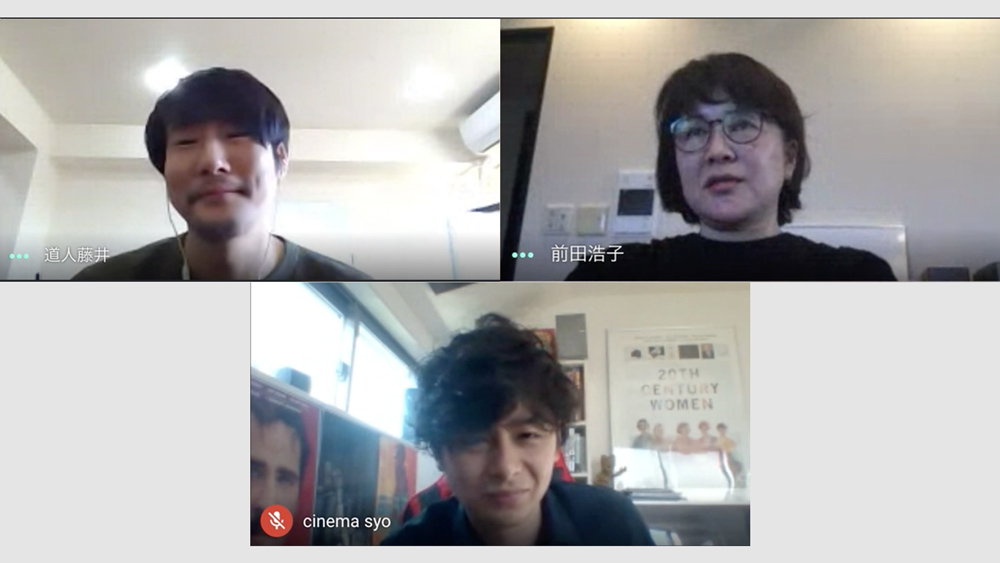![[CINEMORE ACADEMY Vol.1] Project edition How to make the movie “The Brightest Roof in the Universe”](https://cinemore.jp/images/2be591d4a8d6be44619fb632680890b96c9d53770d266f035fc4879846f5c2ee.jpg)
[CINEMORE ACADEMY Vol.1] Project edition How to make the movie “The Brightest Roof in the Universe”
What are some tips for successfully using the production committee method?
Q: The topic of the "production committee method" came up in today's talk, but the production committee method is often given a negative impression, saying that it doesn't reflect the intentions of the director or producer. I think. What is the reason why it worked this time?
Fujii: Hiroko-san became Musashibo Benkei, and I'm sure there are many things that weren't brought to light on set, but the members of the Happinet team who acted as production managers for this time came to the set many times and edited the work. I think the fact that he was present on set and that he thought it was ``his movie'' was a big factor.
KADOKAWA, the distributor, told me what they thought about the script, but if I didn't do something like that, they'd stop distributing it or stop investing in it, or anything like that.
Maeda: We tried to create as many opportunities for discussion as possible, including when it came to casting. We want people to feel like ``this team is making this together.'' As a result, there was a strong sense of ``ONE TEAM'' among everyone.
It's a bit rare that when we did a preview screening for the people involved, everyone jumped out and said, ``Wow! This is interesting!'' and not a single one of us lost motivation.

This interview was conducted online.
Q: Communication is important here as well.
Maeda: As you said earlier, with the production committee system, there are cases where people are frustrated because they can't see a way out, and as a result, the work is not progressing well... Yes. But this time, they truly entrusted us with their care and were a generous partner.
Fujii: I think the production committee method is also case-by-case. I think it's great that everyone is taking matters into their own hands and thinking about why it's meaningful to make this movie right now, rather than just connecting with it as a business.
The pattern of dysfunction in a production committee is when everyone has no idea why they are making the movie. I often see warning signs like this.
There are many times when I meet people for the first time, such as at award ceremonies, and they say, ``You did a great job,'' and then I realize that it was someone from the production committee (lol). Because we often don't meet in the first place. This time, everyone knows each other.
Maeda: Yes, that's why I thought my job this time was to shorten the distance between the director and the production committee. We had Happinet and KADOKAWA come to the scene.
The director is the on-set commander, so he usually doesn't have a lot of free time, but perhaps because he was in a stable mood, he chatted with the members of the production committee who came and said, ``We've filmed something interesting.'' That's what he said. Everyone went home feeling energized from the set, so they said, ``I want to come again.'' It was a work in which all kinds of good energy gradually grew.
――――――――――――――
When you watch overseas movie news, you see headlines that say, ``Movie rights acquired!'', but it may have been difficult to get a sense of just how difficult it was. Through this interview, I think the ``planning'' part before deciding on the staff and cast has become clearer.
Also, the relationship between a director and producer is often referred to as ``accomplice,'' but the loving dialogue between director Fujii and producer Maeda gives us a glimpse of the ideal relationship between ``director'' and ``producer.'' Researching the producers of your favorite movies can be a fun way to watch movies. I would like you to put this into practice.
The next theme is scriptwriting. We will hear more about how the script that forms the backbone of the movie is created, focusing on the script for ``The Brightest Roof in the Universe,'' which he said he spent three years carefully developing. looking forward to!
Vol.2: Click here for the script!
Interview and text: SYO
Born in 1987. After The Graduate from Tokyo Gakugei University, he worked at a film magazine editorial production site and a film information site before becoming a film writer. Works on a wide range of topics including interviews, reviews, columns, event appearances, and recommendation comments. Contributed to ``CINEMORE'', ``FRIDAY Digital'', ``Fan's Voice'', ``Eiga.com'', etc. Twitter「 syocinema 」
"The brightest roof in the universe"
(c)2020 “The Brightest Roof in the Universe” Production Committee
Nationwide release in fall 2020
Distribution: KADOKAWA

